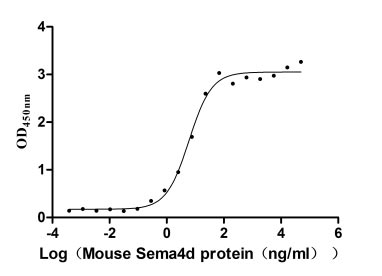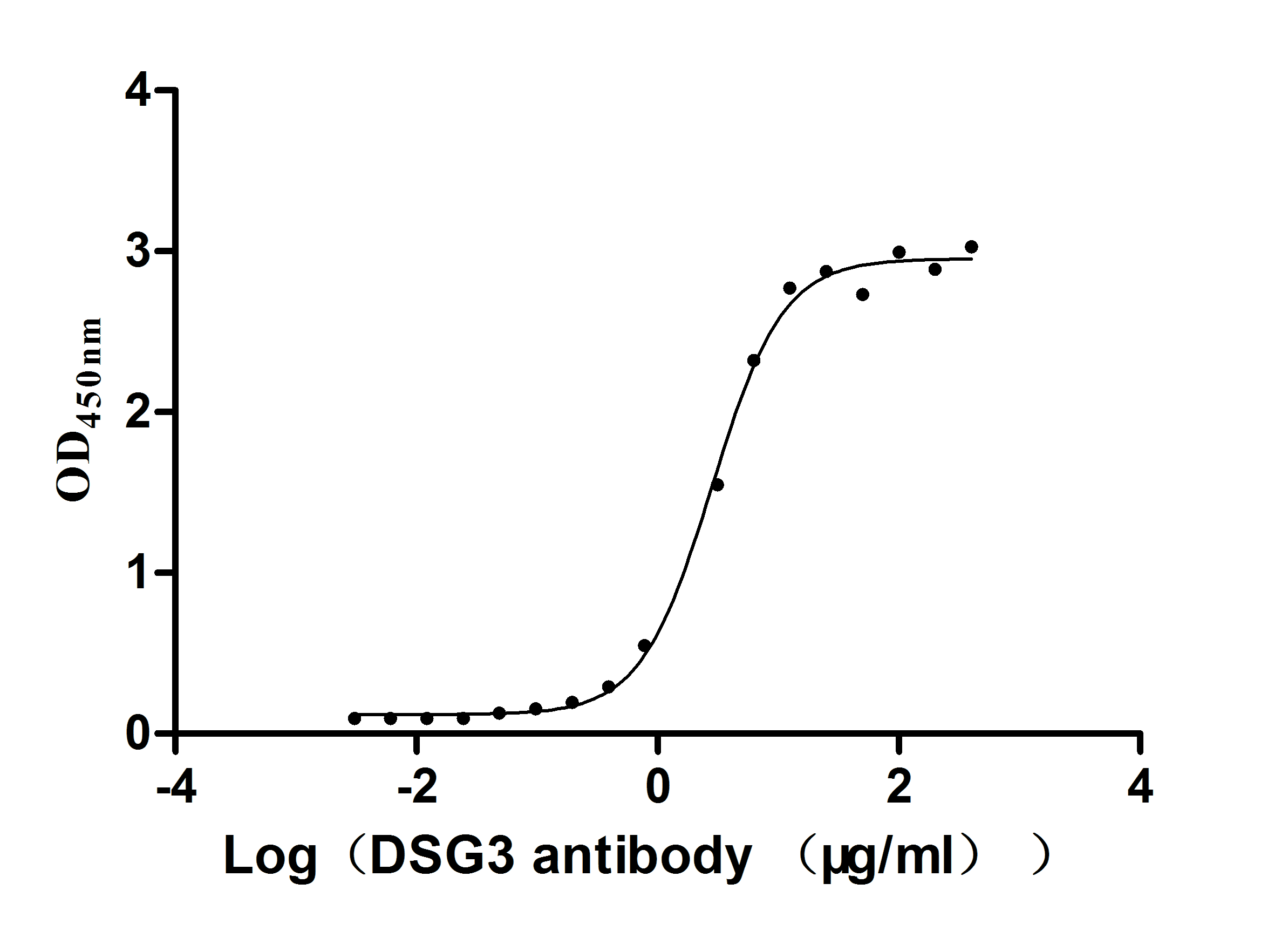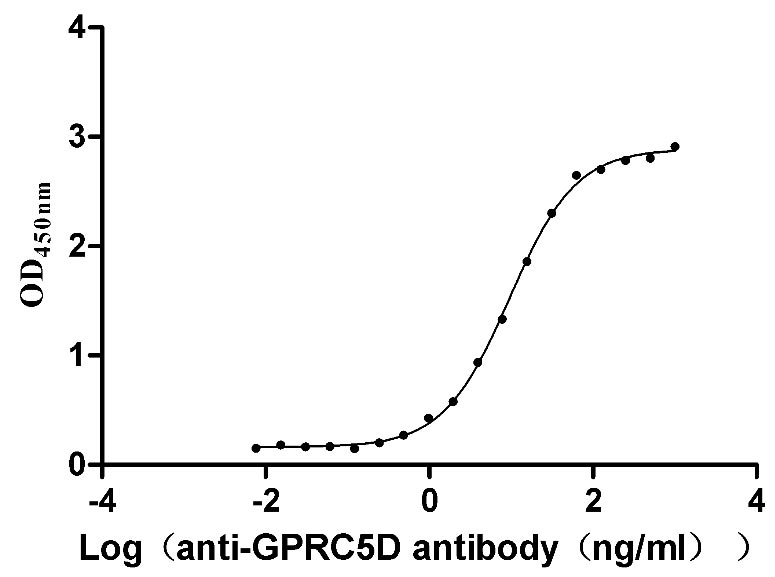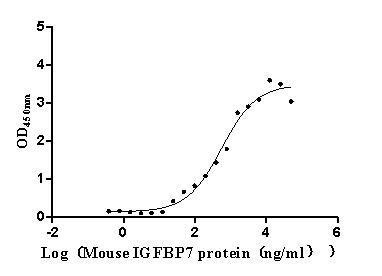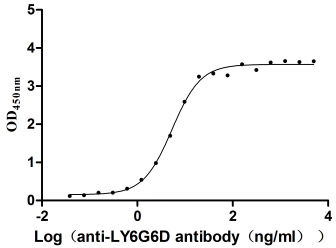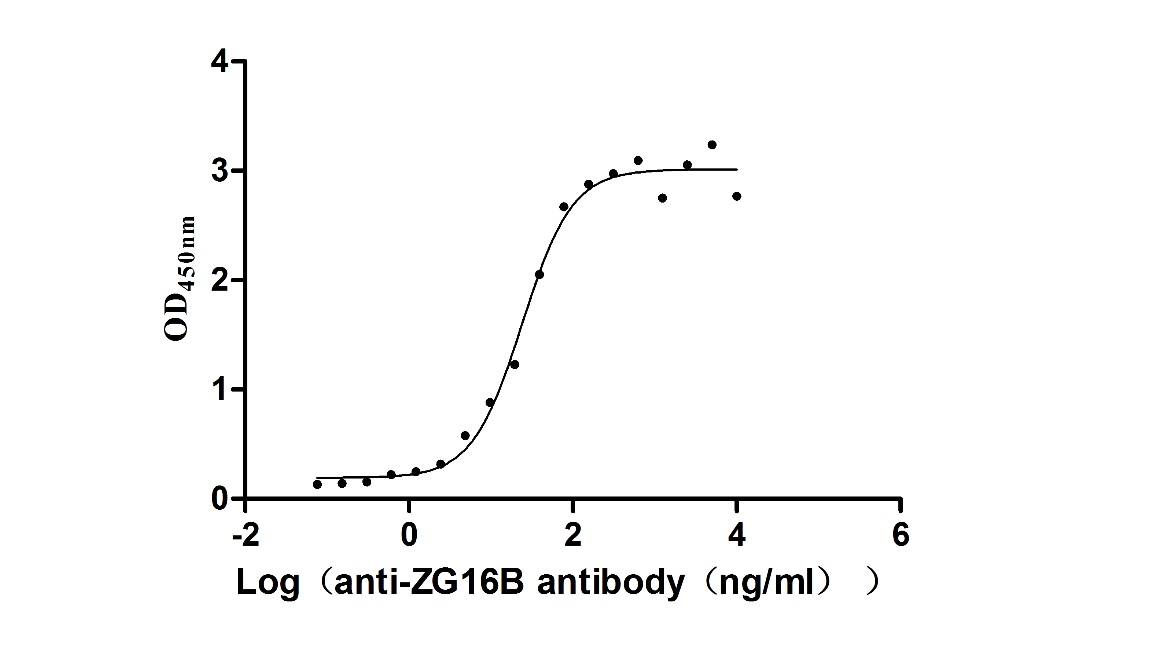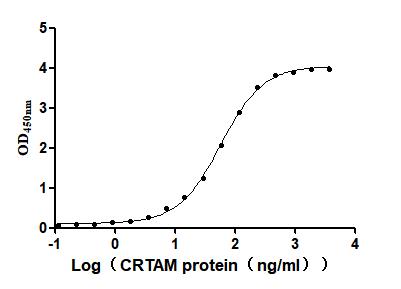Recombinant Human High affinity copper uptake protein 1 (SLC31A1), partial
-
货号:CSB-YP021575HU1
-
规格:
-
来源:Yeast
-
其他:
-
货号:CSB-EP021575HU1
-
规格:
-
来源:E.coli
-
其他:
-
货号:CSB-EP021575HU1-B
-
规格:
-
来源:E.coli
-
共轭:Avi-tag Biotinylated
E. coli biotin ligase (BirA) is highly specific in covalently attaching biotin to the 15 amino acid AviTag peptide. This recombinant protein was biotinylated in vivo by AviTag-BirA technology, which method is BriA catalyzes amide linkage between the biotin and the specific lysine of the AviTag.
-
其他:
-
货号:CSB-BP021575HU1
-
规格:
-
来源:Baculovirus
-
其他:
-
货号:CSB-MP021575HU1
-
规格:
-
来源:Mammalian cell
-
其他:
产品详情
-
纯度:>85% (SDS-PAGE)
-
基因名:SLC31A1
-
Uniprot No.:
-
别名:SLC31A1; COPT1; CTR1; High affinity copper uptake protein 1; Copper transporter 1; hCTR1; Solute carrier family 31 member 1
-
种属:Homo sapiens (Human)
-
蛋白长度:Partial
-
蛋白标签:Tag type will be determined during the manufacturing process.
The tag type will be determined during production process. If you have specified tag type, please tell us and we will develop the specified tag preferentially. -
产品提供形式:Lyophilized powder
Note: We will preferentially ship the format that we have in stock, however, if you have any special requirement for the format, please remark your requirement when placing the order, we will prepare according to your demand. -
复溶:We recommend that this vial be briefly centrifuged prior to opening to bring the contents to the bottom. Please reconstitute protein in deionized sterile water to a concentration of 0.1-1.0 mg/mL.We recommend to add 5-50% of glycerol (final concentration) and aliquot for long-term storage at -20℃/-80℃. Our default final concentration of glycerol is 50%. Customers could use it as reference.
-
储存条件:Store at -20°C/-80°C upon receipt, aliquoting is necessary for mutiple use. Avoid repeated freeze-thaw cycles.
-
保质期:The shelf life is related to many factors, storage state, buffer ingredients, storage temperature and the stability of the protein itself.
Generally, the shelf life of liquid form is 6 months at -20°C/-80°C. The shelf life of lyophilized form is 12 months at -20°C/-80°C. -
货期:Delivery time may differ from different purchasing way or location, please kindly consult your local distributors for specific delivery time.Note: All of our proteins are default shipped with normal blue ice packs, if you request to ship with dry ice, please communicate with us in advance and extra fees will be charged.
-
注意事项:Repeated freezing and thawing is not recommended. Store working aliquots at 4°C for up to one week.
-
Datasheet :Please contact us to get it.
相关产品
靶点详情
-
功能:High-affinity, saturable copper transporter involved in dietary copper uptake.
-
基因功能参考文献:
- combination of desferal with oxaliplatin can overcome cervical cancer oxaliplatin resistance through the regulation of hCtr1 and TfR1 PMID: 27384479
- Study showed that NEAT1 could function as a competing endogenous lncRNA in lung cancer, mediating CTR1 by sponging hsa-mir-98-5p. PMID: 27270317
- This result indicates that the formation of copper-finger protein of Sp1 is the molecular basis of copper sensing for the transcriptional regulation of hCtr1 in mammalian cells. PMID: 28759062
- we assessed the role of miR-21 in mediating renal cell carcinoma chemoresistance and further showed that miR-21 silencing significantly (1) increased chemosensitivity of paclitaxel, 5-fluorouracil, oxaliplatin, and dovitinib; (2) decreased expression of multi-drug resistance genes; and (4) increased SLC22A1/OCT1, SLC22A2/OCT2, and SLC31A1/CTR1 platinum influx transporter expression PMID: 28714373
- Gene duplication and neo-functionalization in the evolutionary and functional divergence of the metazoan copper transporters Ctr1 and Ctr2 PMID: 28507097
- It has been demonstrated in ovarian cancer cells that cisplatin resistance and uptake correlates with reduced CTR1 and LRRC8A protein expression/activity and a concomitant upregulation in cisplatin exporting transporters (ATP7A, ATP7B), which implies that the resistant cells have a reduced ability to accumulate cisplatin and activate proapoptotic transporters for osmolytes. PMID: 27112899
- CTR1 recycling via clathrin-mediated and Rab11 pathways enable cells to dynamically modulate copper entry PMID: 26945057
- C-Terminus of Human Copper Importer Ctr1 Acts as a Binding Site and Transfers Copper to Atox1 PMID: 26745413
- Studied the interaction of CTR1 and CTR2 in fully malignant HEK293T and OVCAR8 human ovarian cancer cells using a CRISPR-Cas9 knock out system. PMID: 26205368
- High CTR1 Expression is associated with poor response to chemotherapy in Muscle-invasive Bladder Cancer. PMID: 26851002
- Gene silencing of either CTR1 or DMT1 did not affect copper accumulation in cells, but deficiency in both CTR1 and DMT1 resulted in a complete inhibition of copper uptake. PMID: 26067577
- Two methionine residues in the MXXXM motif of of the CTR1 second transmembrane domain are important for binding to silver. PMID: 26061257
- CTR1, ATP7A, and lysyl oxidase were upregulated in the lung tissues and pulmonary arteries of mice with hypoxia-induced pulmonary hypertension and pulmonary arterial smooth muscle cells. PMID: 24614111
- Data suggest that SLC31A1 and SLC31A2, despite being structurally closely related and sharing important amino acid motifs, play different roles in copper homeostasis and in platinum-based chemotherapy of neoplasms. [REVIEW] PMID: 24703712
- allele distribution of the SLC31A1 was not different between group N and O, and out of the 11 SNPs of the SLC22A2 gene only the allele distribution of the nonsynonymous SNP was significantly different between patients who experienced ototoxicity PMID: 25823781
- Extracellular copper concentrations regulate the levels of CTR1 through internalisation and degradation, the addition of prolactin, inhibits the degradation of CTR1, thus promoting copper uptake by mammary epithelial cells. PMID: 24485600
- NSC73306 is a transport substrate of CTR1 PMID: 24800945
- The data collected here shows that the Atox1 keeps its dimer nature also in the presence of the CTR1 c-terminal domain; however, two geometrical states are assumed by the Atox1. PMID: 24837030
- CTR1 expression may be necessary for therapeutic efficacy of platinum based drugs in non-small cell lung cancer treatment. PMID: 24792335
- Cisplatin transcriptionally induces the expression of human Ctr1 in time- and concentration-dependent manners. PMID: 24132751
- Knockdown of CTR1 expression in human umbilical cord endothelial cells increases cell proliferation and migration. PMID: 24039729
- Duodenal CTR1 mRNA and protein expression was decreased in Wilson's disease patients, while ATP7A mRNA and protein production was increased. This can be a defense mechanism against systemic copper overload resulting from functional impairment of ATP7B. PMID: 23963605
- This study demonistrated that Inhibition of human high-affinity copper importer Ctr1 orthologous in the nervous system of Drosophila ameliorates Abeta42-induced Alzheimer's disease-like symptoms. PMID: 23827522
- The patients with tumors showing high expression levels of at least one of OATP1B3 and CTR1 had potentially longer disease-free survival. PMID: 23782748
- Results show that hCTR1 elements on the intracellular side of the hCTR1 pore, including the carboxyl tail, are not essential for permeation, but serve to regulate the rate of copper entry. PMID: 23658018
- Depletion of glutathione decreases cellular copper uptake mediated by human copper transporter 1. PMID: 23426973
- Our findings imply that reduced CTR1 expression accounts for decreased cisplatin accumulation and represents one of the determinants of cisplatin resistance in A2780cis cell line PMID: 23010323
- Cisplatin induces drug resistant phenotype by decreasing the protein level of CTR1 in human esophageal squamous carcinoma cell line EC109. PMID: 21602128
- genetic association study in Han population in China: Data suggest that SNPs in SLC31A1 (rs7851395; rs12686377) are associated with resistance to platinum compounds as antineoplastics and survival outcomes in non-small cell lung carcinoma patients. PMID: 22725681
- This review explains how modulating cellular copper availability could influence treatment efficacy in platinum-based cancer chemotherapy through hCtr1 regulation[review] PMID: 22962276
- CTR1 plays an essential role in cisplatin toxicity and could be considered as a predictor for pretreatment evaluation in lung cancer patients. PMID: 22516052
- The cells expressing the hCTR1 mutants of histidine-rich motifs in the N-terminus (H22-24A, NHA) resulted in a higher basal copper level in the steady state compared to those expressing wild-type protein. PMID: 22552365
- There was little difference in rates/kinetics of uptake of copper in the Ctr1+/+ and -/- cells. Endocytosis was not involved. PMID: 22354499
- Structure of CTR1 confirms that two triads of methionine residues delineate the intramembranous region of the transporter, and further identifies two additional methionine triads that are located in the extracellular N-terminal part of the transporter. PMID: 22569840
- basal expression of Ctr1 is regulated by HIF2alpha; however, the induction by hypoxia is a HIF2alpha-independent event PMID: 22684009
- Data show that both shRNA-DMT1 and shRNA-hCTR1 cells had lower apical Fe uptake, Cu uptake, and Zn content compared to control cells. PMID: 22068728
- Compared the binding interactions between cisplatin, carboplatin and oxaliplatin with synthetic peptides corresponding to hCtr1 Mets motifs. PMID: 21072377
- Data show apical localization of Ctr1 in intestinal epithelia and suggest that increased Ctr1 apical localization in response to dietary copper limitation may represent an adaptive response to modulate Ctr1 availability at the site of copper absorption. PMID: 20699218
- Ctr1 is an important transport protein in the accumulation of silver in mammalian cells. PMID: 20569931
- Identified as dominant hinge regions, CTR1's MxxxM and GxxxG motifs were shown to have significant roles in functional movements characterized by the two slowest modes of motion. PMID: 20534491
- findings reveal a high level of conservation between the mammalian and insect Ctr1-type copper importers PMID: 19856191
- Results demonstrate that co-exposure of tumor cells to emodin or DRB with cisplatin inhibits platinum drug uptake by impacting the hCtr1 transporter. PMID: 19529937
- Sequence analysis demonstrated SLC31A1 on chromosome 9 was rearranged with breaks occurring within its intron. SLC31A1 lies close to BSPRY which is a candidate for cleft lip/palate involvement. PMID: 19929093
- fundamentally conserved mechanism for high affinity copper uptake through the Ctr proteins in yeast and humans PMID: 11983704
- biochemical characterization and subcellular localization PMID: 12023893
- observations demonstrate that, although Ctr1 is critical for both cellular copper uptake and embryonic development, mammals possess additional biochemically distinct functional copper transport activities PMID: 12177073
- Results suggest that human copper transporter 1 (CTR1) spans the membrane at least six times, permitting formation of a channel, which is consistent with its proposed role as a copper transporter. PMID: 12466020
- hCtr1-mediated copper uptake into mammalian cells is regulated by a post-translational mechanism involving copper-stimulated endocytosis and degradation of the transporter PMID: 12501239
- there are common biochemical mechanisms regulate both transport and trafficking functions of hCtr1 PMID: 14976198
- there is a direct interaction between cisplatin and the hCtr1 protein; cisplatin and copper have distinct biochemical consequences on this transporter PMID: 15326162
显示更多
收起更多
-
亚细胞定位:Cell membrane; Multi-pass membrane protein.
-
蛋白家族:Copper transporter (Ctr) (TC 1.A.56) family, SLC31A subfamily
-
数据库链接:
HGNC: 11016
OMIM: 603085
KEGG: hsa:1317
STRING: 9606.ENSP00000363329
UniGene: Hs.532315
Most popular with customers
-
Recombinant Mouse Semaphorin-4D (Sema4d), partial (Active)
Express system: Mammalian cell
Species: Mus musculus (Mouse)
-
Recombinant Mouse Desmoglein-3 (Dsg3), partial (Active)
Express system: Mammalian cell
Species: Mus musculus (Mouse)
-
Recombinant Human G-protein coupled receptor family C group 5 member D (GPRC5D)-VLPs (Active)
Express system: Mammalian cell
Species: Homo sapiens (Human)
-
Recombinant Mouse Complement component C1q receptor (Cd93), partial (Active)
Express system: Mammalian cell
Species: Mus musculus (Mouse)
-
Recombinant Macaca fascicularis lymphocyte antigen 6 family member G6D (LY6G6D) (Active)
Express system: Yeast
Species: Macaca fascicularis (Crab-eating macaque) (Cynomolgus monkey)
-
Recombinant Macaca fascicularis zymogen granule protein 16 homolog B (ZG16B) (Active)
Express system: Mammalian cell
Species: Macaca fascicularis (Crab-eating macaque) (Cynomolgus monkey)
-
Recombinant Mouse Cytotoxic and regulatory T-cell molecule (Crtam), partial (Active)
Express system: Mammalian cell
Species: Mus musculus (Mouse)
-
Recombinant Human Interleukin-2 (IL2) (Active)
Express system: Mammalian cell
Species: Homo sapiens (Human)


